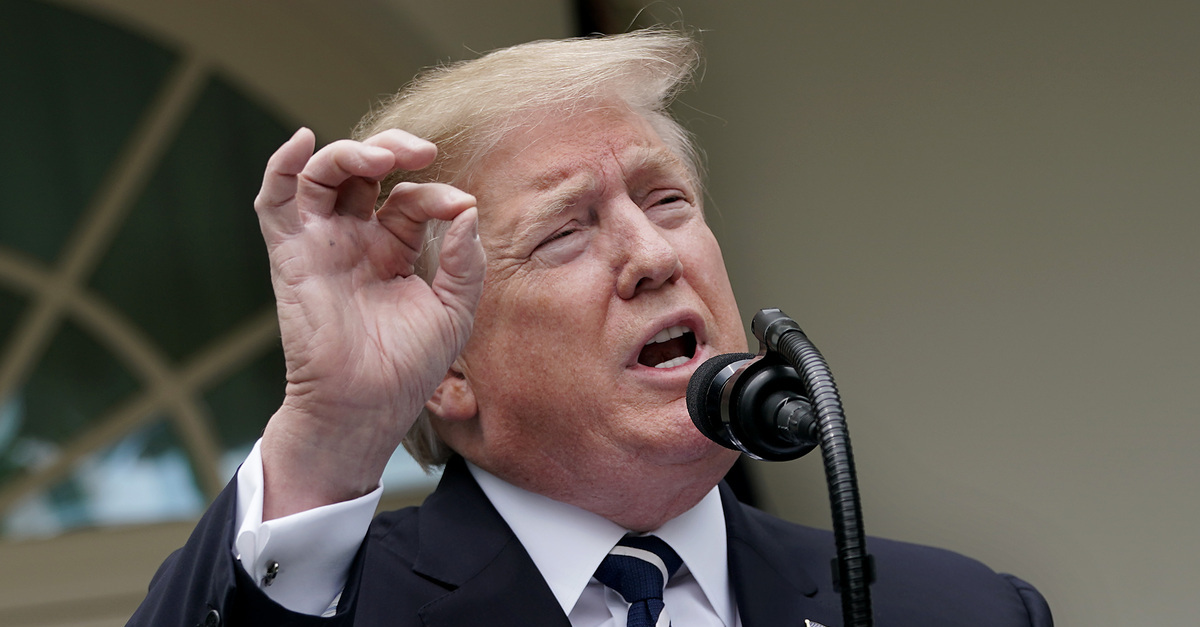
One grows weary of saying that words have meaning, but alas. President Donald Trump is making like Bill Weld and playing fast and loose with the word treason again. Trump went on Twitter Sunday and Monday and threw the T-word out there, aiming these comments directly at House Intelligence Committee Chairman Rep. Adam Schiff (D-Calif.).
https://twitter.com/Popehat/status/1178657461902823425?s=20
The president is clearly still upset about Schiff’s performance from last week.
“Rep. Adam Schiff illegally made up a FAKE & terrible statement, pretended it to be mine as the most important part of my call to the Ukrainian President, and read it aloud to Congress and the American people. It bore NO relationship to what I said on the call. Arrest for Treason?” Trump asked.
The president of the United States said something similar on Sunday.
“I want Schiff questioned at the highest level for Fraud & Treason,” Trump tweeted. Trump is, of course, referring to Schiff’s opening statement during the Acting DNI Joseph Maguire hearing of last week, during which Schiff described, “in essence,” what Trump said on his phone call with Ukraine President Volodymyr Zelensky.
Schiff, instead of strictly sticking to the not-necessarily-verbatim-nor-complete-five-page-memo of the call, floated the most damning inferences possible:
And what is the President’s response — well it reads like a classic organized crime shake down. In essence, what the President Trump communicates is this: We’ve been very good to your country. Very good. No other country has done as much as we have. But you know what, I don’t see much reciprocity here. You know what I mean? I hear what you want. I have a favor I want from you though. And I’m going to say this only seven times, so you better listen good. I want you to make up dirt on my political opponent, understand? Lots of dirt, on this and on that. I’m going to put you in touch with people, and not just any people. I’m going to put you in touch with the Attorney General of the United States — my Attorney General, Bill Barr — he’s got the whole weight of American law enforcement behind him. And I’m going to put you in touch with Rudy, you’re going to love him. Trust me. You know what I’m asking, so I’m only going to say this a few more times, in a few more ways. And don’t call me again. I’ll call you when you’ve done what I asked.
Again, this was Schiff’s reading of the readout we all saw, and he received criticism for it. He even admitted it was a bad idea and a bad way to make his case:
George Stephanopoulos: “If the facts are as damning as you say why make up dialogue for dramatic effect, even if it’s a parody as you say?”
Schiff: “Well George, you’re right. The call speaks for itself and it is plenty damning.”
In any event, whatever you feel about Schiff’s judgment in performing a “parody” — or straight-up lying, depending on your point of view — it wasn’t a treasonous act.
The statute for treason, 18 U.S. Code § 2381, was deliberately drawn to include a very narrow set of circumstances and reads as follows:
Whoever, owing allegiance to the United States, levies war against them or adheres to their enemies, giving them aid and comfort within the United States or elsewhere, is guilty of treason and shall suffer death, or shall be imprisoned not less than five years and fined under this title but not less than $10,000; and shall be incapable of holding any office under the United States.
Note that this does not say that lying to Congress about the president is a treasonous offense.
University of Texas School of Law professor Steve Vladeck, who has written extensively on the topic of treason, explained the common misconception in an NBC News op-ed last year.
“Because of this history, a lot of things that might seem or feel like treason to casual observers do not, in fact, come close. In this context ‘enemies,’ for example, must be countries against which Congress has formally declared war or otherwise authorized the use of force. (So contemporary Russia is out, whatever role it may have played in the 2016 election),” Vladeck wrote. “Even during the height of the Cold War, when Julius and Ethel Rosenberg were tried, convicted and executed for conveying nuclear secrets to the Soviet Union, the charge against them was espionage, not treason.”
“And ‘levying war’ against the United States requires active and direct participation in an armed conflict, not just ‘un-American’ speech or insufficient patriotism,” he added.
Indeed, in U.S. law, treason has an extremely limited legal definition. It is one of the few original crimes against the state listed in the U.S. Constitution. Located in Article III, Section 3, the relevant language reads:
Treason against the United States, shall consist only in levying War against them, or in adhering to their Enemies, giving them Aid and Comfort. No Person shall be convicted of Treason unless on the Testimony of two Witnesses to the same overt Act, or on Confession in open Court.
Treason, therefore, must consist of either: (1) levying war against the United States; or (2) giving aid and comfort to enemies of the United States. So, what does that actually mean? Well, pretty much what it says. Levying war means actually engaging in armed conflict against the United States. Giving aid and comfort to enemies would require someone providing such help to a nation state subject to a formal declaration of war by Congress.
Colin Kalmbacher and Jerry Lambe contributed to this report.
[Image via Chip Somodevilla/Getty Images]